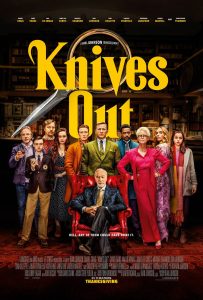 Harlan Thrombey committed suicide. Slit his own throat. It was an odd way to go, sure, but Harlan was as odd man. The problems start when not everyone believes that the award-winning mystery author killed himself. The police believe it. Harlan’s children believe it. Private detective Benoit Blanc, however, does not. And if there is one thing Benoit Blanc excels at, it is identifying the guilty and rooting out the truth.
Harlan Thrombey committed suicide. Slit his own throat. It was an odd way to go, sure, but Harlan was as odd man. The problems start when not everyone believes that the award-winning mystery author killed himself. The police believe it. Harlan’s children believe it. Private detective Benoit Blanc, however, does not. And if there is one thing Benoit Blanc excels at, it is identifying the guilty and rooting out the truth.
Okay. Two things. Two things he excels at.
Knives Out, directed by Rian Johnson and starting a cast of big names almost too long to list here, is a whodunnit in the classical vein. Christopher Plummer plays author Harlan Thrombey, who dies unexpectedly and apparently by his own hand. He leaves behind a writing empire and two generations of privileged, semi-spoiled family members who accept the death as a suicide and line up for the reading of the will. Along the way, the audience is walked through the questions of greed, guilt versus innocence, and truth. This month, Eve and I tackle the whodunnit and discuss the whydunnit. Where the actions of any of the character righteous, or were they all motivated by sinful desires?
First Impressions
Knives Out is a surprisingly entertaining movie, given that we both came into it with different expectations. It really was a classic mystery that didn’t feel like it rehashed the great mystery movies of the past. The music is composed by Nathan Johnson, cousin and frequent collaborator with director Rian Johnson. The Knives Out soundtrack is mostly classical and really lends to the feel and atmosphere while standing well on its own as an original work.
The set decoration really supported the entire feel of the movie and helped pay homage to the great mystery writers of the past without being obnoxious about it. The classic elements were all melded so well with the modern stereotypes that felt seamless even while throwing around jokes about the Hallmark channel and Netflix.
The trailers that both Eve and I had seen made the movie feel like a murder mystery with strong comic elements. While there were some funny bits, they weren’t an element of the movie, and it took us a little bit to stop waiting for the funny to emerge. Once we did, though, we got sucked fully into the mystery.
The cast of Knives Out is pretty big, and it has some even bigger names in it—including Captain America himself, Chris Evans. Yet the movie is presented in a way that every member of the ensemble not only gets screen time, but they shine in roles that truly serve the story. In the opening scenes, the characters are juxtaposed against their tales of what happened as they relate them to the investigators versus what really happened. Through this mechanic, they get to demonstrate the acting chops that made them great. Even knowing what really happened with each of the “suspects”, the ending still manages to pleasantly surprise with interesting twists.
Knives Out is rated PG-13, and it earns it through excessive use of bad language—much of it from Chris Evan’s character, Ransom Thrombey. The language isn’t the only objectionable content, it is the significant majority of it. For a great breakdown of the positive and negative elements of Knives Out, be sure to check out the review on Focus on the Family‘s movie review website, Plugged In Online.
The writing in Knives Out is smart. The movie allows you to swing opinions on the characters, each time rewarding you with a tidbit of information that informs you on both the characters’ motivations and the mystery.
Unlike much of the contemporary fare that comes out of Hollywood these days, the political discussion in the movie had no clear bias regarding liberalism or conservatism. It was there, but felt much more like average family disagreements than “hit-over-the-head” Hollywood opinion. It was a nice departure from the norm.

From here on in, we are discussing the whodunnit portion of this whodunnit, so spoilers abound. If you haven’t seem the movie, do yourself a favor and take it in before continuing. The ending really is so much more rewarding if it isn’t spoiled.
I Didn’t Mean To, Did I?
About halfway through the movie, we learn that Harlan Thrombey did, indeed, commit suicide, though he did so convinced that he had already suffered a fatal overdose due to an error by his beloved friend and nurse, Marta. In the minutes that Harlan has between the overdose and the suicide, he concocts a brilliant plan for Marta to follow that will allow her to avoid not only the loss of her nursing license, but the scrutiny that would lead to the deportation of her undocumented family.
At the time, both Harlan and Marta believe wholeheartedly that Marta had accidentally overdosed Harlan. Marta then must go through the next several days carrying around the guilt of her actions. What Marta did would have been at most manslaughter, sure, but not murder. She still carried the guilt of killing her friend, though.
In Numbers 35:9-34, the law lays out a new and different way for those who unintentionally kill another to find justice through the Cities of Refuge. The situation is even more in need of that kind of consideration, as it turns out that Marta instinctively gave Harlan the correct dosages, despite the intent of the real murderer that she should fatally overdose him.
The circumstances around Harlan’s suicide are so complicated that it made us question if it really could be considered as such. He believed he was a dead man walking, and took his own life in hopes of saving that of his dear friend and her family. What’s worse, we, the audience, find out that Marta did not overdose Harlan and that he took his life needlessly. His most noble of sacrifices was completely unnecessary. Unnecessary, maybe, but no less potent:
No one has greater love than this: to lay down his life for his friends. (John 15:13)
Harlan’s self-sacrifice really is admirable, particularly as you learn more and more about the circumstances around it and come to understand what Harlan knew when he made the snap decision to sacrifice himself. It actually compounds the responsibility of the actual murderer as you come to the realization that none of this had to happen but for their nefarious machinations. While he may not have known it, this is the mission that Harlan fulfills in his final act of sacrifice. All but the most broken should chafe at injustice, feel for the refugee, and desire to help those in need.
Provide justice for the needy and the fatherless;
uphold the rights of the oppressed and the destitute.
Rescue the poor and needy;
save them from the power of the wicked. (Psalm 82:3-4)
Through the movie, Marta’s feelings of guilt are palatable, but those of the murderer—the person who set out to kill Harlan—are non-existent. The way that Marta’s conscience convicts her is similar to how the Holy Spirit convicts us of our sins, allowing us to learn from our mistakes, to greater appreciate the sacrifice of Christ on the cross, and to redouble our praise of our loving and just God.
I Want It Now!
 The overwhelming motivating factor for the Thrombey family is greed. Not just for money, but for power and easy living—all the things that access to money provides. The greed they all felt informed all of their family interactions—the birthday party, the reading of the will, the prenuptial agreements; everything was focused materially. When the family was gathering for the reading of the will, Benoit Blanc observed, “They are a pack of vultures at the feast: knives out, beaks bloody.” Going into the reading, each person had been privately advised that they were being written out of the will, but none knew if Harlan had the opportunity to do so before his unexpected demise. Combine greed and fear and nothing good comes of it.
The overwhelming motivating factor for the Thrombey family is greed. Not just for money, but for power and easy living—all the things that access to money provides. The greed they all felt informed all of their family interactions—the birthday party, the reading of the will, the prenuptial agreements; everything was focused materially. When the family was gathering for the reading of the will, Benoit Blanc observed, “They are a pack of vultures at the feast: knives out, beaks bloody.” Going into the reading, each person had been privately advised that they were being written out of the will, but none knew if Harlan had the opportunity to do so before his unexpected demise. Combine greed and fear and nothing good comes of it.
Greed is a recurring theme in scripture as well, even contributing to God’s judgement on Israel as related in the book of Jeremiah:
For from the least to the greatest of them, everyone is greedy for unjust gain; and from prophet to priest, everyone deals falsely. (Jeremiah 6:13)
So, how did they get to that level of depravity? Not surprisingly, we come back to how they were raised. Eve and I often find ourselves considering the formative relationships of family when talking about characters, and the Thrombey family is no exception. Harlan learned (too late, apparently) that his coddling of his children and grandchildren had allowed them to [mostly] grow complacent and greedy. This knowledge is what prompted him cut them all out of the estate and business dealings. One of the red flags that Harlan had seen was problems in the homes of his children, similar to what we see in Proverbs:
Whoever is greedy for unjust gain troubles his own household, but he who hates bribes will live. (Proverbs 15:27)
The relationships between the Thrombey siblings were strained at best, rotting at worst, but all maintained for appearances. Still it could be seen and heard in the little things and the snide comments, always taken just a hair or two further than a loving family might. They are all motivated, one way of another, by selfish reasons or desires. It’s likely they would be, though. As Christians, we are able to resist this sinful nature only through the indwelling of the Holy Spirit. Yet, the indwelling is not a guarantee that we will not be tempted to embrace money as the solution to all our problems. When instructing Timothy on how to shepherd a church, Paul tells him;
For the love of money is a root of all kinds of evil, and by craving it, some have wandered away from the faith and pierced themselves with many griefs. (1 Timothy 6:10)
And this is for brothers and sisters in Christ. How much more difficult is it for those without the Holy Spirit to guide them?
The Thrombey family greed was both symptom and cause of their problems. Sure, they all gain different things from the family patriarch, but with one possible exception, they all depend on his beneficence as well. They have come to desire what they receive, unearned, from Harlan Thrombey’s money, to the point of placing it above other more important elements in their lives. In short, they have come to worship it.
Context of Truth
Benoit Blanc isn’t just about finding the truth, but about finding the whole truth. In Knives Out we see him find the truth and then dig deeper to understand the circumstances of it. Blanc calls himself, “a respectful, quiet, passive observer… of the truth.” Later, he clarifies that, “The [complexity?] lies not in the truth, but what you do with the truth once you have it.” Blanc knows that he is not there just to find out who murdered Harlan Thrombey, but to figure out all the questions connected to Thrombey’s murder—including, who hired him to investigate it. It is only through answering the primary question and considering it with all the connected questions that you can take wise action on what finding the truth reveals.
The ultimate Truth is that of the Gospel of Christ. Jesus is the way, the truth, and the life. Yet few come to salvation from that truth alone. Seekers see how the love of Jesus, the characteristics of God, all interact within the world and their lives to more fully understand the incredible nature and power of that truth. As believers, called to share the Gospel, we have to use these connections to the truth to communicate what the Gospel means to us. If we do it well, we might be blessed enough to usher a new believer to Christ. If we do it poorly, we may turn entire communities against the Way. We are commanded to share the Truth of Christ, and to do it in such a way that it leads others to the saving love of Jesus:
Jesus came near and said to them, “All authority has been given to me in heaven and on earth. Go, therefore, and make disciples of all nations, baptizing them in the name of the Father and of the Son and of the Holy Spirit, teaching them to observe everything I have commanded you. And remember, I am with you always, to the end of the age.” (Matthew 28:18-20)
Reading of the Will
One of the core elements of Christian truth is that of our undeserved inheritance of grace through the sacrifice of Christ Jesus as propitiation for our sin.
For the wages of sin is death, but the gift of God is eternal life in Christ Jesus our Lord. (Romans 6:23)
Like Marta, we do not deserve the inheritance which God bestows upon us. It is only through our relationship with our Savior that we receive it. Harlan’s children and grandchildren believe that they deserve the inheritance, but they have missed the entire lesson that Harlan tried to teach them (admittedly very late). Marta came to love Harlan, and it was through that love that she came into her inheritance. Harlan’s family may or may not have loved him, but that love was secondary to what they wanted from him.
And, let’s face it, that’s not the way love works. Is it?
Please support the podcast!

Are You Just Watching? is listener supported. Special thanks to our current patrons: Craig Hardee, Stephen Brown II, and Peter Chapman for their generous support. We can't continue to share critical thinking for the entertained Christian without your financial help, so please head on over to our Patreon page and become one of our supporting patrons!
Share your feedback!
What did you think of Knives Out? We would like to know, even if just your reactions to the trailer or the topics we shared in this episode. Or what general critical-thinking and entertainment thoughts or questions do you have? Would you like to suggest a movie or TV show for us to give a Christian movie review with critical thinking?
- Comment on the shownotes
- Call (513) 818-2959 to leave a voicemail
- Email feedback@AreYouJustWatching.com (audio files welcome)
- Join our Facebook discussion group.

1 comment on “Knives Out – AYJW099”